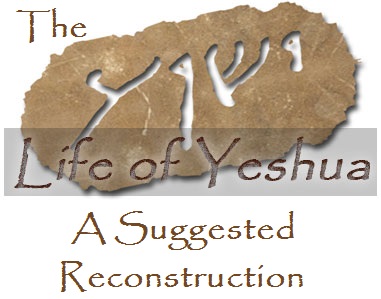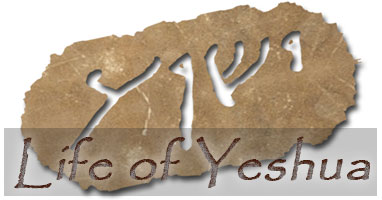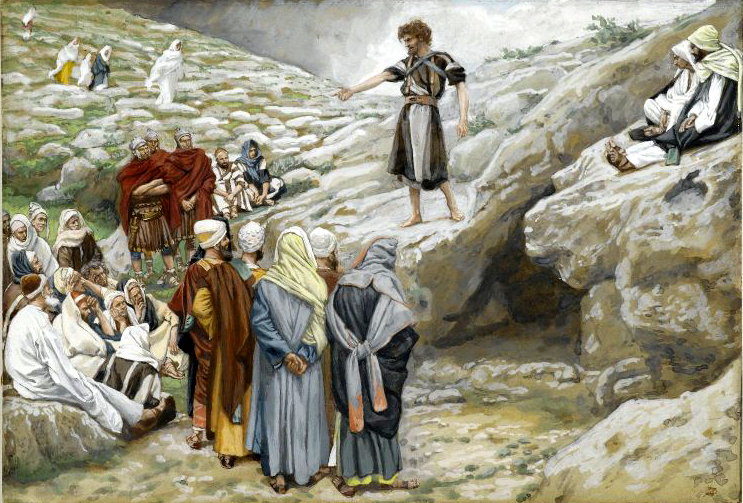Luke 3:10-14
(Huck 3; Aland 15; Crook 18)[68]
Revised: 14 December 2023
וַיִּשְׁאָלוּהוּ הָאֻכְלוּסִים לֵאמֹר מַה נַּעֲשֶׂה וַיַּעַן וַיֹּאמֶר לָהֶם מִי שֶׁיֵּשׁ לוֹ שְׁנֵי חֲלוּקוֹת יִתֵּן לְמִי שֶׁאֵין לוֹ וּמִי שֶׁיֵּשׁ לוֹ מַה יֹּאכַל כָּכָה יַעֲשֶׂה וַיָּבֹאוּ מוֹכְסִים לִטְבּוֹל לְפָנָיו וַיֹּאמְרוּ לוֹ מוֹרֵנוּ מַה נַּעֲשֶׂה וַיֹּאמֶר לָהֶם אַל תִּפָּרְעוּ מֵאָדָם יוֹתֵר מִמַּה שֶּׁקָּצוּב לָכֶם וַיִּשְׁאָלוּהוּ אִיסְטְרַטְיוֹטִים לֵאמֹר מַה נַּעֲשֶׂה וַיֹּאמֶר לָהֶם אַל תַּחְמֹסוּ וְאַל תַּעֲשֹׁקוּ אָדָם וְתִתְרַצּוּ בְּאָפְסַנְיוֹתְכֶם
The people in the crowd asked Yohanan, “What should we do to bring our repentance to fruition?”
“Whoever owns two sets of clothing should share with those who have nothing to wear,” he replied. “And whoever has food to eat should share with those who are going hungry.”
Some toll collectors also came to Yohanan to be purified under his supervision, and they asked, “Teacher, what should we do to bring our repentance to fruition?”
“Don’t take more toll money from anyone than what the authorities have assigned to you,” he replied.
Some soldiers asked Yohanan, “What should we do to bring our repentance to fruition?”
“Don’t extort or oppress anyone,” he replied. “Rather, be satisfied with your keep.”[69]
| Table of Contents |
|
3. Conjectured Stages of Transmission 5. Comment 8. Conclusion |
 .
.
.
.
.
Reconstruction
To view the reconstructed text of Yohanan the Immerser’s Exhortations, click on the link below:
Premium Members and Friends of JP must be signed in to view this content.
If you are not a Premium Member or Friend, please consider registering. Prices start at $5/month if paid annually, with other options for monthly and quarterly and more: Sign Up For Premium
 Click here to return to The Life of Yeshua: A Suggested Reconstruction main page.
_______________________________________________________
Click here to return to The Life of Yeshua: A Suggested Reconstruction main page.
_______________________________________________________
- [1] On the audience’s question τί ποιήσωμεν (ti poiēsōmen, “What might we do?”) as a follow up to the Baptist’s demand to ποιήσατε καρπὸν ἄξιον τῆς μετανοίας (poiēsate karpon axion tēs metanoias, “Do/make fruit worthy of repentance”; Matt. 3:8; cf. Luke 3:8), see E. H. Scheffler, “The Social Ethics of the Lucan Baptist (Lk 3:10-14),” Neotestamentica 24.1 (1990): 21-36, esp. 27; J. Liebenberg, “The Function of the Standespredigt in Luke 3:1-20: A Response to E H Scheffler’s The Social Ethics of the Lucan Baptist (Lk 3:10-14),” Neotestamentica 27.1 (1993): 55-67, esp. 60-62. ↩
- [2] See Yohanan the Immerser Demands Repentance, Comment to L1-2. ↩
- [3] Cf. Kazen, 232 n. 128. ↩
- [4] Other scholars, too, have attributed Yohanan the Immerser’s Exhortations to the source common to Luke and Matthew. See Plummer, Luke, 90; Marshall, 142. Cf. Knox, 2:4; Davies-Allison, 1:311. ↩
- [5] The material on John the Baptist in Luke 7 is an example of a large block of material copied from Anth. without intrusions from FR. See our introduction to the “Yohanan the Immerser and the Kingdom of Heaven” complex. ↩
- [6] See Foakes Jackson-Lake, 1:103; Scheffler, “The Social Ethics of the Lucan Baptist (Lk 3:10-14),” 28. ↩
- [7] J. Duncan M. Derrett (“The Baptist’s Sermon: Luke 3,10-14,” Bibbia e Oriente 37.3 [1995]: 155-165) suggested that the text upon which the Baptist’s exhortations are based is Exod. 23:1-13, with special attention to the Sabbatical Year commands in Exod. 23:11. While this suggestion would cohere with our impression that John the Baptist was motivated by a Sabbatical/Jubilee ideology, his reliance upon Exod. 23:1-13 in Yohanan the Immerser’s Exhortations is difficult to verify. ↩
- [8] Pace Hartwig Thyen, “ΒΑΠΤΙΣΜΑ ΜΕΤΑΝΟΙΑΣ ΕΙΣ ΑΦΕΣΙΝ ΑΜΑΡΤΙΩΝ,” in The Future of our Religious Past: Essays in Honour of Rudolf Bultmann (ed. James M. Robinson; trans. Charles E. Carlston and Robert P. Scharlemann; New York: Harper & Row, 1971), 131-168, esp. 136-137. See Meier, Marginal, 2:40-42. ↩
- [9] Cf. Tomson, If This Be, 131. ↩
- [10] Other scholars, too, have noted the similarities between the portrayals of John in Yohanan the Immerser’s Exhortations and in the writings of Josephus. See Foakes Jackson-Lake, 1:106; Bundy, 49 §3; David Flusser, “The Baptism of John and the Dead Sea Sect,” in his Jewish Sources in Early Christianity: Studies and Essays (Tel Aviv: Sifriat Poalim, 1979), 81-112, esp. 83-84 (in Hebrew); Meier, Marginal, 2:61-62. ↩
- [11] Cf., e.g., Ernst Bammel, “The Baptist in Early Christian Tradition,” New Testament Studies 18 (1971-1972): 95-128, esp. 105-106; Brent Kinman, “Luke’s Exoneration of John the Baptist,” Journal of Theological Studies 44.2 (1993): 595-598. ↩
- [12] Cf. David Flusser, “The Half-shekel in the Gospels and the Qumran Community” (Flusser, JSTP1, 327-333, esp. 333). ↩
- [13] Cf. LHNS, 11 §3. A textual variant in Codex Bezae reads ἐπηρώτησαν (epērōtēsan, “they asked”), exactly as in our reconstruction. If Codex Bezae preserves the original reading of Luke 3:10, then it was not the author of Luke, but a later scribe, who made the stylistic improvement by replacing ἐπηρώτησαν (“they asked”) with ἐπηρώτων (“they were asking”). ↩
- [14] Cf. LHNS, 11 §3. ↩
- [15] On the secondary nature of ἵνα μὴ...σωθῶσιν in Luke 8:12, see Four Soils interpretation, Comment to L34. ↩
- [16] See George E. Rice, The Alteration of Luke’s Tradition by the Textual Variants in Codex Bezae (Ph. D. dissertation, Case Western Reserve University, 1974), 50-52. ↩
- [17] According to Lindsey, the Anthologizer (i.e., the creator of Anth.) did not change the wording of the Greek translation of the Hebrew Life of Yeshua. ↩
- [18] See Scheffler, “The Social Ethics of the Lucan Baptist (Lk 3:10-14),” 25-26. ↩
- [19] In Gen. 4:10, for instance, τί ἐποίησας (“What have you done?”) is the translation of מֶה עָשִׂיתָ (“What have you done?”). Likewise, in Gen. 27:37 τί ποιήσω (“What might I do?”) is the translation of מָה אֶעֱשֶׂה (“What will I do?”). ↩
- [20] The question τί ποιήσωμεν also occurs as the translation of מַה נַּעֲשֶׂה in Judg. 21:7, 16; 1 Kgdms. 5:8; 6:2; 2 Kgdms. 16:20; 2 Chr. 20:12; Song 8:8. In NT the question τί ποιήσωμεν appears in Acts 2:37; 4:16. ↩
- [21] See LHNS, 11 §3. ↩
- [22] On the clothing worn by first-century Jews, see Shmuel Safrai, “Religion in Everyday Life” (Safrai-Stern, 2:793-833, esp. 797-798); Dafna Shlezinger-Katzman, “Clothing” (OHJDL, 362-381). ↩
- [23] See Shlezinger-Katzman, “Clothing” (OHJDL, 368). ↩
- [24] Text according to Emmanuel Miller, ed., Origenis Philosophumena (Oxford: Oxford University Press, 1851). ↩
- [25] On Hippolytus’ source of information regarding the Essenes, see Morton Smith, “The Description of the Essenes in Josephus and the Philosophumena,” Hebrew Union College Annual 29 (1958): 273-313; Geza Vermes and Martin D. Goodman, The Essenes According to the Classical Sources (Sheffield: JSOT Press, 1989), 62-63. For a different view, see Albert I. Baumgarten, “Josephus and Hippolytus on the Pharisees,” Hebrew Union College Annual 55 (1984): 1-25. ↩
- [26] Since it was his intention to demonstrate how the Essenes were in error, Hippolytus had no reason to “Christianize” the Essenes by suggesting that they adhered to the teachings of John the Baptist (Luke 3:11) or to the instructions Jesus gave to the apostles (Matt. 10:10; Mark 6:9; Luke 9:3). ↩
- [27] But see Smith, “The Description of the Essenes in Josephus and the Philosophumena,” 290. ↩
- [28] Cf. David Flusser, “Jesus’ Opinion about the Essenes” (Flusser, JOC, 150-168, esp. 162-163). ↩
- [29] See Hatch-Redpath, 2:915. The sole instance where μεταδιδόναι occurs as the translation of a Hebrew term, that term is הִשְׁבִּיר (hishbir, “purchase grain”; Prov. 11:26), which is not suitable for HR in Yohanan the Immerser’s Exhortations. ↩
- [30] See Hatch-Redpath, 1:231. ↩
- [31] Additional examples of מִי שֶׁיֵּשׁ/אֵין לוֹ מַה יֹּאכַל occur in m. Moed Kat. 3:4; m. Ned. 4:7, 8; 5:6; t. Moed Kat. 1:11. ↩
- [32] See Hatch-Redpath, 2:993. ↩
- [33] On the insertion of καί after δέ as an editorial trait of the author of Luke, see Yohanan the Immerser Demands Repentance, Comment to L17. ↩
- [34] On reconstructing διδάσκαλος with רַב, see Not Everyone Can Be Yeshua’s Disciple, Comment to L5. ↩
- [35] See Hatch-Redpath, 2:1201. ↩
- [36] See LSJ, 1460-1461. ↩
- [37] On the discussion of the collectors of tolls and the poll tax in t. Bab. Metz. 8:26, see Call of Levi, Comment to L68. ↩
- [38] Additional examples of -יוֹתֵר מִמַּה שֶּׁ are found in m. Ket. 3:9 and t. Bab. Bat. 2:20. ↩
- [39] See Gill, 7:339. ↩
- [40] For a discussion on the rabbinic debate over evading tolls, see Louis Ginzberg, “The Significance of the Halachah for Jewish History,” in his On Jewish Law and Lore (New York: Atheneum, 1970), 86-89. ↩
- [41] See LHNS, 11 §3. ↩
- [42] See Jastrow, 92. ↩
- [43] A variant form of the loanword for “soldier,” סְטַרְטְיוֹט (seṭarṭeyōṭ) (see Jastrow, 973) instead of אִיסְטְרַטְיוֹט (’isṭeraṭyōṭ) as in the previous examples, is also attested:
ב″ו מכתיב לו סטרטיוטין גבורים בריאים כדי ללבוש קסדא ושריון וכלי זיין והקב″ה הכתיב סטרטיוטין שלו שאינן נראין שנא′ עושה מלאכיו רוחות
Flesh and blood enlists for himself soldiers [סְטַרְטְיוֹטִין] who are brave and healthy so that they can wear helmets and mail and bear arms, but the Holy One, blessed is he, enlists soldiers [סְטַרְטְיוֹטִין] who are not seen, as it is said, he makes his messengers winds [Ps. 104:4]. (Exod. Rab. 15:22)
Since this is the only source in which we have located the form סְטַרְטְיוֹט, and since this source is late compared to the others we have cited, we have preferred the spelling אִיסְטְרַטְיוֹט for HR. ↩
- [44] Tertullian (mid-second to mid-third cent. C.E.), for instance, appears to have assumed that the toll collectors and soldiers who came to John the Baptist were Gentiles, since he contrasted them with the “sons of Abraham” (On Modesty chpt. 10). More recently, the identification of the soldiers as Gentiles has been tentatively put forward by J. Green (180). ↩
- [45] Cf. Montefiore, TSG, 2:387; Fitzmyer, 1:470; Davies-Allison, 308 n. 38. ↩
- [46] Cf. Christopher M. Tuckett, “John the Baptist in Q,” in his Q and the History of Christianity: Studies on Q (Edinburgh: T&T Clark, 1996), 107-137, esp. 115. ↩
- [47] See Plummer, Luke, 92; Jeremias, Theology, 48 n. 3, 110; Marshall, 143; Nolland, Luke, 1:150. Jeremias’ argument that στρατευόμενος (stratevomenos) refers to police whereas στρατιώτης (stratiōtēs) refers to soldiers is weakened by the fact that Josephus used the term στρατευόμενος to refer to soldiers (cf., e.g., J.W. 5:555; 6:54; Ant. 11:46; 19:357; 20:176). The term στρατευόμενος also refers to a soldier in 2 Tim. 2:4. ↩
- [48] On Jewish military service in the Roman period, see Shimon Applebaum, “Jews and Service in the Roman Army,” Roman Frontier Studies: Proceedings of the 7th International Congress, Tel Aviv 1967 (1971): 181-184; idem, “The Legal Status of the Jewish Communities in the Diaspora” (Safrai-Stern, 1:420-463, esp. 458-460). Schoenfeld’s accusation that “the participation of Jews in the Roman military is a topic that is underemphasized or frankly ignored by historians” applies to “Appelbaum [sic.],” who “claims that Jews in the Roman army were ‘renegades,’” is wholly unjustified. Applebaum’s use of the term “renegade” (“Jews and Service in the Roman Army,” 182), as any careful reader of his article will immediately agree, does not reflect his own value judgment, but echoes the vocabulary of an ancient source (Gen. Rab. 82:8 [ed. Theodor-Albeck, 2:984-985], cited above) that refers to an apostate Jew who became a soldier during the Hadrianic persecutions. See Andrew J. Schoenfeld, “Sons of Israel in Caesar’s Service: Jewish Soldiers in the Roman Military,” Shofar: An Interdisciplinary Journal of Jewish Studies 24.3 (2006): 115-126, quotation on 116. ↩
- [49] From Josephus (Life §46) and rabbinic sources (y. Pes. 6:1 [39b]) we hear of inhabitants of Bathyra who are active in Jerusalem. If the solders mentioned in Yohanan the Immerser’s Exhortations came from Bathyra, the Galilee was certainly closer to home than Jerusalem. ↩
- [50] In addition to Jewish soldiers in the service of Herodian rulers, Josephus mentions a Jewish military colony in Egypt at Leontopolis, which existed from the time of Antiochus IV Epiphanes until shortly after the destruction of the Temple in Jerusalem (see J.W. 7:420-436; Ant. 13:62-73, 284-287, 351-355; 14:131-132). We also learn from Josephus that in the first half of the first century C.E. the Parthian king Artabanus III made two Jewish brothers military commanders in Mesopotamia (Ant. 18:310-370). ↩
- [51] See Moulton-Milligan, 153. ↩
- [52] Text and translation according to Bernard P. Grenfell and Arthur S. Hunt, eds. and trans., The Oxyrhynchus Papyri: Part II (London: Egypt Exploration Fund, 1899), 184. ↩
- [53] On the anti-imperialist critique implied by the Essene slogans הוֹן חָמָס and הוֹן אַנְשֵׁי חָמָס, see David Flusser, “The Roman Empire in Hasmonean and Essene Eyes” (Flusser, JSTP1, 175-206, esp. 194-197). ↩
- [54] See Hatch-Redpath, 2:1301. ↩
- [55] On reconstructing μηδείς with אִישׁ, see Sending the Twelve: Conduct on the Road, Comment to L77. ↩
- [56] See Moulton-Milligan, 471; Chrys C. Caragounis, “ΟΨΩΝΙΟΝ: A Reconsideration of Its Meaning,” Novum Testamentum 16.1 (1974): 35-57, esp. 42. ↩
- [57] See Lightfoot, 3:52. Caragounis (“ΟΨΩΝΙΟΝ: A Reconsideration of Its Meaning,” 38) noted that ὀψώνιον entered Latin as obsonium or opsonium, so it appears that this was an international word that easily crossed linguistic boundaries. ↩
- [58] The plural form אָפְסַנְיוֹת also occurs in Sifre Deut. §328 (ed. Finkelstein, 378). ↩
- [59] On μισθός as the Greek equivalent of שָׂכָר, see Sending the Twelve: Conduct in Town, Comment to L97. ↩
- [60]
Yohanan the Immerser’s Exhortations Luke’s Version Anthology’s Wording (Reconstructed) καὶ ἐπηρώτων αὐτὸν οἱ ὄχλοι λέγοντες τί οὖν ποιήσωμεν ἀποκριθεὶς δὲ ἔλεγεν αὐτοῖς ὁ ἔχων δύο χιτῶνας μεταδότω τῷ μὴ ἔχοντι καὶ ὁ ἔχων βρώματα ὁμοίως ποιείτω ἦλθον δὲ καὶ τελῶναι βαπτισθῆναι καὶ εἶπον πρὸς αὐτόν διδάσκαλε τί ποιήσωμεν ὁ δὲ εἶπεν πρὸς αὐτούς μηδὲν πλέον παρὰ τὸ διατεταγμένον ὑμῖν πράσσετε ἐπηρώτων δὲ αὐτὸν καὶ στρατευόμενοι λέγοντες τί ποιήσωμεν καὶ ἡμεῖς καὶ εἶπεν αὐτοῖς μηδένα διασείσητε μηδὲ συκοφαντήσητε καὶ ἀρκεῖσθε τοῖς ὀψωνίοις ὑμῶν καὶ ἐπηρώτησαν αὐτὸν οἱ ὄχλοι λέγοντες τί ποιήσωμεν ἀποκριθεὶς δὲ εἶπεν αὐτοῖς ὁ ἔχων δύο χιτῶνας δότω τῷ μὴ ἔχοντι καὶ ὁ ἔχων βρώματα ὁμοίως ποιείτω ἦλθον δὲ τελῶναι βαπτισθῆναι καὶ εἶπον πρὸς αὐτόν διδάσκαλε τί ποιήσωμεν ὁ δὲ εἶπεν πρὸς αὐτούς μηδὲν πλέον παρὰ τὸ διατεταγμένον ὑμῖν πράσσετε ἐπηρώτησαν δὲ αὐτὸν στρατευόμενοι λέγοντες τί ποιήσωμεν καὶ εἶπεν αὐτοῖς μηδένα διασείσητε μηδὲ συκοφαντήσητε καὶ ἀρκεῖσθε τοῖς ὀψωνίοις ὑμῶν Total Words: 73 Total Words: 68 Total Words Identical to Anth.: 64 Total Words Taken Over in Luke: 64 Percentage Identical to Anth.: 87.67% Percentage of Anth. Represented in Luke: 94.12% ↩
- [61] A Gentile God-fearer might revere Israel’s God in addition to his or her own ancestral deities. On diversity of practice among God-fearing Gentiles, see Paula Fredriksen, “‘If It Looks like a Duck, and It Quacks like a Duck...’: On Not Giving Up the Godfearers,” in A Most Reliable Witness: Essays in Honor of Ross Shepard Kraemer (ed. Susan Ashbrook Harvey et al.; Providence: Brown Judaic Studies, 2015), 25-33. ↩
- [62] Martin Luther, “Temporal Authority: To What Extent It Should Be Obeyed (1523),” in Luther’s Works (55 vols.; ed. Jaroslav Pelikan and Helmut T. Lehmann; Saint Louis: Concordia; Philadelphia: Fortress, 1958-1986), 45:98. ↩
- [63] See Augustine, Epistle 138 2:15; Epistle 189 §4; Reply to Faustus the Manichæan 22:74. ↩
- [64] The items borne by the biblical heroes roughly correspond to articles of a Roman soldier’s uniform. ↩
- [65] Translation adapted from The Ante-Nicene Fathers (10 vols.; ed. Alexander Roberts, James Donaldson, Allan Menzies; repr. Grand Rapids: Eerdmans, 1980-1986), 3:73. ↩
- [66] Translation according to The Testament of Our Lord, Translated into English from the Syriac with Introduction and Notes (trans. James Cooper and Arthur John MacLean; Edinburgh: T&T Clark, 1902), 118. ↩
- [67] On varying attitudes toward military service in the early centuries of the Christian Church, see Henry J. Cadbury, “The Basis of Early Christian Antimilitarism,” Journal of Biblical Literature 37 (1918): 66-94; Alan Kreider, “Military Service in the Church Orders,” Journal of Religious Ethics 31.3 (2003): 415-442. ↩
- [68] For abbreviations and bibliographical references, see “Introduction to ‘The Life of Yeshua: A Suggested Reconstruction.’” ↩
- [69] This translation is a dynamic rendition of our reconstruction of the conjectured Hebrew source that stands behind the Greek of the Synoptic Gospels. It is not a translation of the Greek text of a canonical source. ↩




